Ted Kaczynski
Ted Kaczynski’s Letter to Jacques Ellul
Note: Since writing this letter several years before the present date, which is Sept., 1983, I have modified some of my opinions. Compare my other writings. Especially, I no longer consider the proposal expressed on p.9 to be the most effective way of attacking the technological society.
T. J. Kaczynski
Steeple Pass Bond
Lincoln, Montana 59659
United States of America
Dear Professor Ellul
I greatly admire your books—those of them that I have had the opportunity to read—especially The Technological Society, which I have read through completely at least six times. However, the purpose of this letter is to make a number of comments—some of them negative—related to the idea of revolution that yon put forward in Autopsy of Revolution. I apologize for writing to you in English rather than French, but my knowledge of French is very rudimentary, at best.
1. It appears to me that, as long as the technological society exists, the kind of revolution you advocate can never occur. I don’t think I have to explain why—you could probably explain it better yourself than I could. But I would go further than you seem to, and may that such a revolution is beyond the bounds of reasonable possibility. (However, there may be other means of destroying the technological society. I shall make a suggestion along these lines later on.)
2. At the beginning of the section Focus of Revolution (Autopsy of Revolution, Chapter 5) you apparently refer to your revolution as an “explosion”. Presumably you mean that the technological society is to disintegrate suddenly and emotionally. But in this case it is probable that the technological society would be destroyed only for a very short time.
You can hardly be so hopeful as to suppose that everyone without exception, will participate in your revolution. There will surely remain a minority who are very willing to use technique for their own ends. In the chaos following revolution the antitechnical majority will be unable to act together effectively because they will be unorganized (destruction of organization in one of the main objective of your revolution). But the ideas of organization would remain, so would a a good deal of material technique (machines, weapons, etc.) and some sophistication concerning propaganda and the like. Certain minorities would organize themselves and attempt to salvage as much of this technique is possible. The rest of the population (being unorganized) would be unable to control this, and the advantages of technique would eventually give power to the minorities who exploit the technique most effectively. Thus (within, say, a decade or two) some kind of technological society would be re-created. There is a process of natural selection (as we may call it) operating here. Technique always wins because (by definition) it is the most effecient system. The unorganized situation following a violent revolution would give free play to this natural selection.
3. This point about natural selection deserves further discussion. First, two examples.
(a) Why did agricultural societies supplant hunting and-gathering societies throughout the world? Certainly not because man chose agriculture as a preferable way of life: Hunting game and gathering wild vegetable foods involves interesting and varied work and leaves considerable leisure time; primitive agriculture typically requires a great deal of monotonous drudgery. The common notion of the primitive hunter as being constantly engaged in an unremitting struggle with the “hostile” forces of nature is nonsense. It is civilized man who sees nature as hostile: The hunter feels very much at home in his environment, and, as noted above, he generally has ample leisure time. In any case, I do not know of a single hunting-and-gathering culture that has voluntarily become agricultural when introduced to that way of life through contact with civilization. These people embrace agriculture only when the loss of their hunting grounds leaves them no other choice.
So why did agriculture triumph everywhere? The answer seems clear. Leaving aside the question of how the first agricultural societies arose, once such societies had come into being it was inevitable that they should spread over the whole world, simply because of their superior economic efficiency. Agriculture can support a vastly denser population than hunting and gathering can. Because an army of several hundred can always defeat a little band of ten or twenty hunters, it follows that whenever agriculturalists wanted land occupied by hunter-gatherers, they were in a position to ...
...
[Page 4 is missing]
...
4. It seems to me that you put too much emphasis on consumption and affluence as targets of your revolution. Probably, affluence and excessive consumption represent only a temporary stage in the development of the technological society. Thus some people, in attacking consumption and affluence, may imagine that they are making your revolution when really they are only pushing the technological society on its next, more advanced stage.
What functions do consumption and affluence perform in the technological society? (a) They perform a psychological function by keeping people entertained and distracted, and by providing artificial goals for people to work toward. (If one has nothing else to look forward to or work toward, one can at least look forward to getting that new car.) (b) They provide a stimulus for certain kinds of technical progress.
However, consumption and affluence perform these two functions inefficiently. A large proportion of our economic output serves a purely psychological function; and this is an important waste, because we are beginning to learn that natural resources on which our economy depends are not unlimited. Example: IN the United States, few people buy motorcycles as a practical means of transportation. They ride motorcycles for fun. In many cases the fun is the sense of power they get from riding a powerful motorcycle. However, this consumes precious gasoline, pollutes the air, and contributes to noise problems. We can assume that in the more efficient society of the future, the need for power will be dealt with less wastefully. Either people will be conditioned to gratify their need for power in some less expensive way, or the need for power will be engineered out of the human race by psychological or biological methods. It certainly seems unlikely that motorcycles or other machines represent the most efficient way of dealing with the need for power. Hence these machines will be discarded as more efficient means are developed.
As for the stimulus to technical progress provided by affluence, the need for a wasteful economy to maintain progress is probably a symptom of deficient technique. In a technological society that has gained sufficient technical control over its own organization, one would expect the growth of technical power to take place in a planned, orderly manner, without serious waste. However, we already see that technique is becoming less production-oriented and that its real future lies in other directions.
Thus it seems probable that affluence and excessive consumption will fade away as a natural part of the development of the technological society. IF the importance of affluence is overemphasized in analysing the technological society, then some people, when they see affluence fading, may incorrectly assume that technique is being conquered.
5. In the section Aims of Revolution you say, “the issue is not technology per see, but the present structure of society.” In the section Focus of Revolution, you say that the revolution must be “against the technological society not against technology).” Further on, you indicate that we must “master technology”. This seems to suggest the notion that we can have an advanced technology and still avoid the bad aspects of the technological society. If this is what you meant, then the idea is probably incorrect, and very dangerous.
Obviously, most of our technological capabilities either could not exist, or would have no practical value, without large-scale organization. Take the automobile as an elementary example. Autos cannot be produced in quantity except by assembly-line methods. Perhaps skilled craftsmen would be able to produce a very few autos by hand without having factory-made parts. (This would take immense time and effort.) But autos would not be of practical value without large refineries to produce gasoline efficiently, arrangements to transport petroleum from petroleum-producing regions, and factories which could not produce tires and spare parts inexpensively. Moreover, without a reasonable system of roads, horse-drawn vehicles would probably be more efficient anyway. In fact, if autos were to exist at all in a non-technological society, they could only be toys for the very rich. And if this is true for a comparatively primitive device like the automobile, what can we say about computers, jet planes, and artificial kidneys? Similar remarks apply to most of our technology. It is senseless to speak of “mastering” an advanced technology without subordinating ourselves to large-scale organization. And large-scale organization cannot exist without means for physically or psychologically compelling people to act in accord with the requirements of the organization.
Any attempt to use an advanced technology is dangerous, even if we make an earnest effort to avoid subordinating ourselves to organizations, because the subordination to large organizations often comes about in unexpected ways that cannot be predicted in advance. We go along placidly with no reason to suppose that we are going to lose any autonomy--and then suddenly we realize that we are trapped. I don’t suppose I need to give examples of this. You can probably give more examples than I can.
I fully agree that the real target is the technological society and not technology; but advanced technology cannot exist without the technological society, and moreover the attempt to use an advanced technology tends to create a technological society. Therefore technology itself must be condemned.
6. In the section Aims of Revolution you say, “I am not sure that our young people are prepared to give up their cars, their bathrooms, their phonograph records, or their transistor radios,” thereby implying that it is only things of this nature that we would have to give up. But in all probability a revolution such as you advocate would result in mass starvation. I would be willing to accept mass starvation as the price for the destruction of the technological society, even though I would run as much risk of starving to death as anyone else. Still, we ought to recognize the full consequences of revolution. Since you used the word “explosion”, you seem to envision an explosive disintegration of the technological society. This means that suddenly there would be no more fuel or spare parts for tractors; no means of producing or reliably distributing the large quantities of chemical fertilizers and insecticides on which modern agriculture has become dependent; and insufficient means for transporting the food that is grown to the centers of population. I do not know to what extent agriculture has been technicized in France, but in the United States and Canada (which are important sources of grain for other parts of the world as well) a sudden shattering of the technical organization would mean agricultural disaster.
7. I would like to suggest a different approach to the problem of the technological society. I can forsee that at the outset you will strongly object to what I propose, but if you will take the trouble to continue reading, you may find that I mean something different from what you expect.
An organization should be formed having as its object the ending of all government financial assistance to scientific research (in the nation in which the organization is first formed, to start with). If successful in this, the organisation would then proceed to attack research support by universities and corporations. IN order to have any chance of success, this organisation would have to use propaganda and every other technical means for arousing public antagonism to scientific progress. For a start, the organization would try to get a small following; contributions of money from this small following hopefully would make it possible to obtain services of experts in such fields as advertising and public relations, which in turn would make it possible to obtain a larger following, and so forth. The propaganda would be directed at the average man (it seems unlikely that it would be possible to get the support of the more-or-less intellectual groups) and would attack not present technology, but technological progress. (Most persons would be frightened at any suggestion that they must give up those aspects of technology to which they have already become addicted, and it would be hopeless to ask them to refrain from buying that shiny new toy they see in the advertisement or in the shop window. But there is widespread cynicism, and even antagonism, toward many of the technological advances that are predicted for the future. Propaganda would have to build on this.) There is probably no hope of obtaining the general support of the class (journalists and so forth) which controls the bulk of propaganda in a "democratic" society; but, since this semi-intellectual class already harbors certain misgivings about technical progress, one would attempt to explain the motives of the organisation in terms acceptable to them, and this might succeed in gaining an ambivalant attitude on their part, rather than their uniform hostility to the proposed organization.
I will try to anticipate your objections to this proposal, and answer them.
Objection A. The objective of the proposed organisation is far too limited. Ending government support of technical progress would not end all progress (specifically in areas like administrative technique, etc.). Besides, an end to technical progress should only (at best) prevent the present situation from becoming worse. Our real objective must be to end the technological society, recover some kind of human values, and so forth.
ANSWER. These objections are correct if we consider only immediate consequences. But let us look further ahead.
By formal technical research I mean projects specifically organized for research purposes and conducted by teams of professional technicians. I do not have access to actual statistics, but I think that, in the United States at least, the majority of such research is directly or indirectly dependent on public funds.
If most formal research were halted, then: Progress would be nearly stopped in most areas of material technique (aeronautics, neurophysiology, biochemistry, computer science, etc.) and in wide areas of psychology. Progress would continue for a time in such areas as propaganda, business administration, and the less scientific areas of psychology, but it seems clear that, if formal research were stopped, there would be eventual stagnation in *all technical fields, because much progress in the less scientific areas of technique is dependent on progress in formal areas of technique is dependent on progress in formal technique (propaganda and radio, business administration and computers, education and experimental psychology), and because it appears that in any technique there is a point beyond which further progress is impossible without formally organized research. Note that it is the most advanced areas of technique that are not formal.
Even if no more than the foregoing were accomplished, there might be at least some gain. In the present society it ...
[Page 12 is missing]{1}
... future in formal technique, few young people would be attracted to technical careers. For these and other reasons it seems very probable that, if formal technical research were once stopped, we would see a gradual deterioration of technique--at least of material technique. If this deterioration continued for a sufficient length of time, then (since the technological society cannot exist without its material techniques) the technological society would eventually die.
Note that the organization I have proposed would not be attempting to re-create human values, to liberate man, or anything of the sort. It would only be attempting to use (or misuse, if you prefer) technique (propaganda) in such a way as to cause the death of the technological society. (Compare it to driving an automobile over a cliff. You use the motive power of the automobile itself to destroy the automobile.)
BUT, if the technological society were once destroyed, then anything might become possible, such as recovery of human values, individual autonomy, or anything else. In your terminology, history would become unblocked.
Of course, it may not be entirely certain that the death of the technological society would follow from a stoppage of formal research; but it does seem very likely. Anyway, whatever you may think of the details of the above arguments, it seems hardly open to doubt that an end to government support of research would be a very powerful blow against the technological society, both materially and (especially) psychologically.
Objection B. A process of natural selection, as described in 2. above, would prevent the destruction of the technological society in any case.
ANSWER. In the very long run it seems probable (perhaps [CROSSED OUT TEXT] not certain) that technique must eventually triumph. In the shorter run this need not be so. The goal (attainable or not) of the proposal under consideration is a gradual rather than an explosive disintegration of the technological society. Present governments would remain in control so that minorities could not seize power as so often happens in violent revolution (see 2. above). Society would remain organized but (we hope) this organization would be decaying. After this decay passed a certain point, organized society would have to fall apart (after which the process of natural selection would set in). But it would be a long time before this point was reached, and by that time so much technique would have been lost that it might take centuries for it to be rebuilt.
Of course, all this is somewhat speculative. All I am doing is pointing out a possible (conjectural) route, the first milestone of which would be the end of government-supported research. If that milestone were once reached it would be time to re-examine the prospects and decide where to go from that point.
Objection C. The use of propaganda--even against technique--has a negative effect on man. Such action has no positive value. Propaganda degrades also those who use it. The proposed organization would itself be a technical thing.
ANSWER. With this I fully agree. I do not claim that the activities of the proposed organization would have any intrinsic value. Propaganda does degrade both those who receive it and those who make it. (But since our society is saturated with propaganda already, the addition of a certain amount of anti-technical propaganda would hardly make matters any worse.) However, the relevant question is would the proposed progress represent the best chance of destroying the technological society? I believe it would. If I were to participate in such work, I would feel it a personal humiliation to have to participate in a technical organisation and make propaganda. But if this is a price that must be paid for the destruction of the technological society, then I would pay it.
Objection D. Such an organization, using propaganda and other technical means, would end up being seduced by its own techniques, and (if sufficiently succesful) would become just another dictatorial techincal force.
ANSWER. There is a serious danger of this. It might be possible to avoid this. But let us assume the very worst. Suppose that the organization acheives the most complete success, gains dictatorial power, and institutes intensive anti-technical propaganda, burning of technical books, confinement of scientists to concentration camps, and all the rest.
There is a rule that most large organizations seem to obey. The organization tends to single out one concrete objective which it pursues; all other purposes fall by the wayside. (Examples: (a) Political parties in democracies tend to act for the sole purpose of getting their candidates elected; political ideology usually is not permitted to interfere with this. (b) The state acts to ensure its own security ...
An end to government support for technical research would be a genuine and important blow against the technological society, and, so far as we know, an organisation such as proposed here might conceivably succeed in striking this blow. The success of this plan, unlikely though it is, is far less improbable than the success of any other proposal for attacking the technological society that has yet come to light.
* * * * *
For me, reading your books has been a great relief from the frustration of reading authors who seem psychologically incapable of coming to grips with the full magnitude of the problem presented by the technological society.
Theodore J. Kaczynski

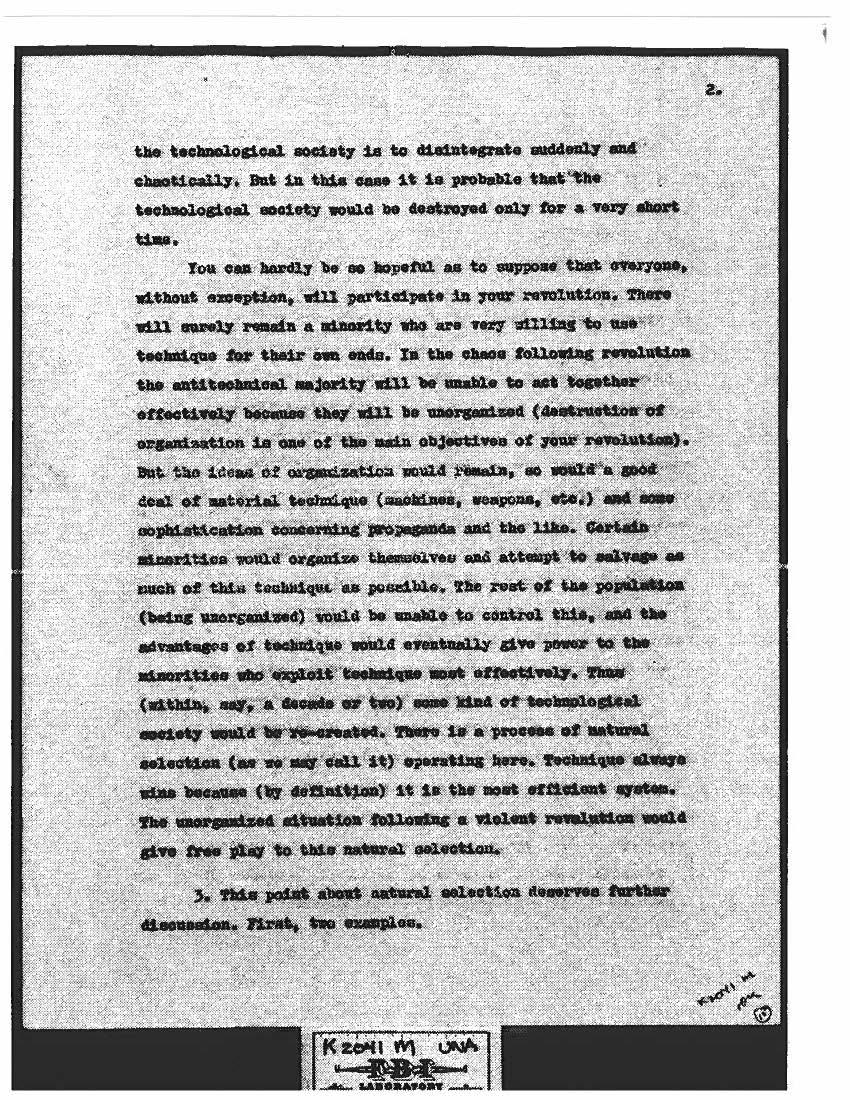

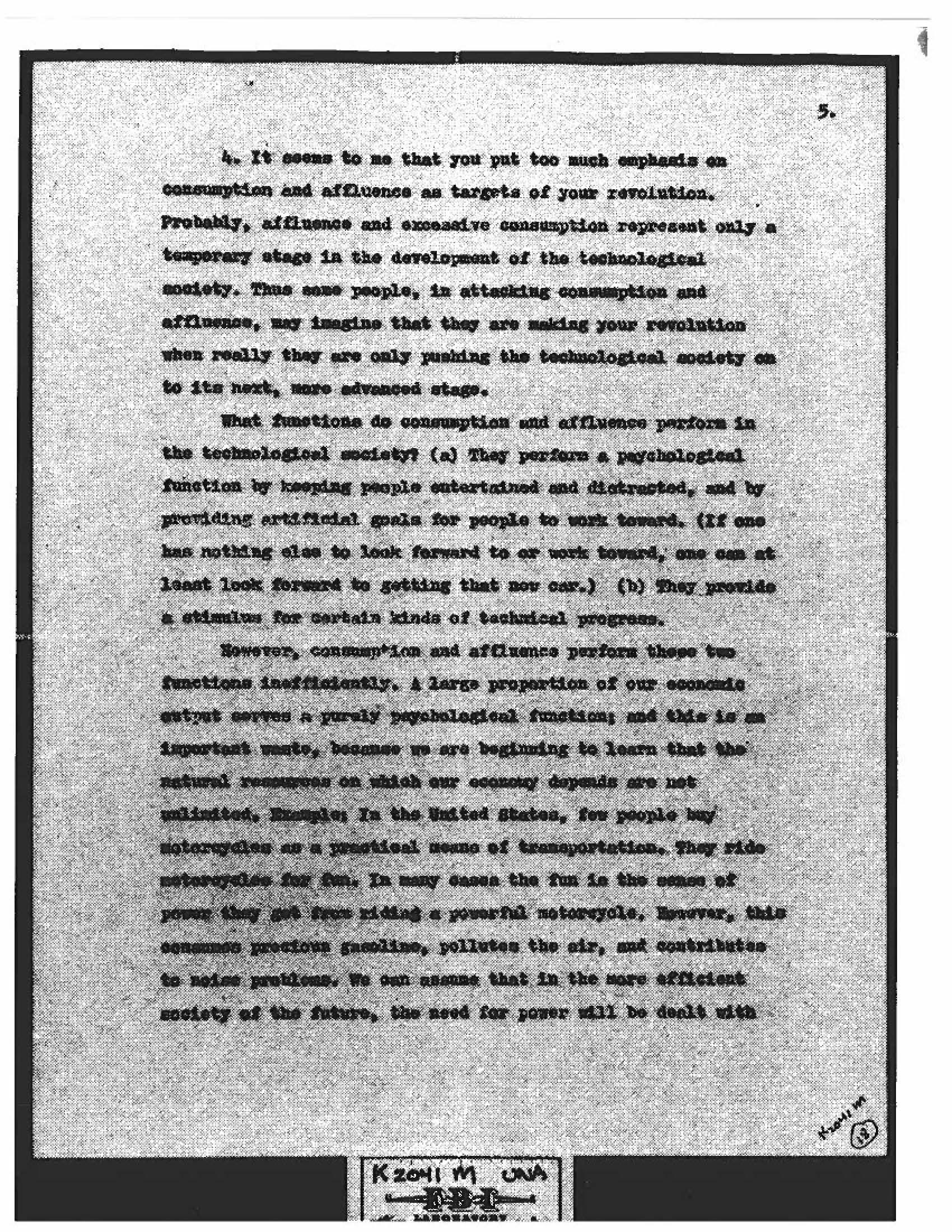

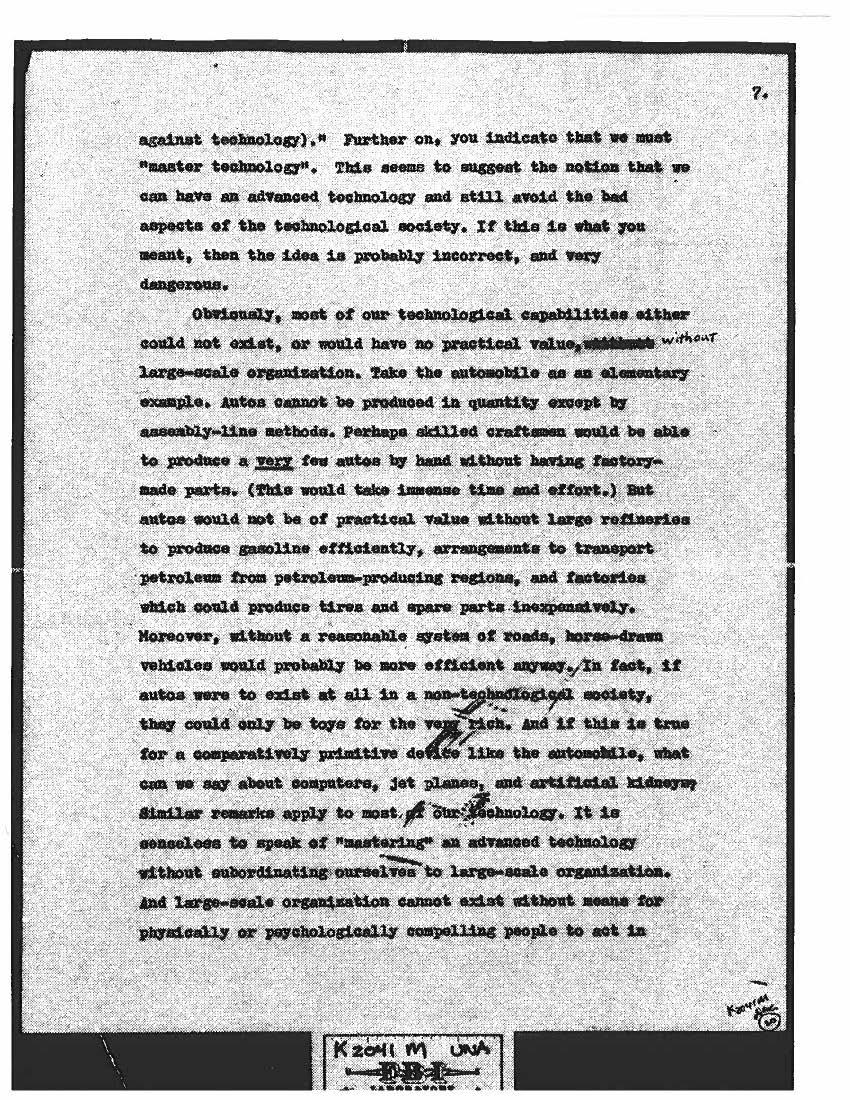
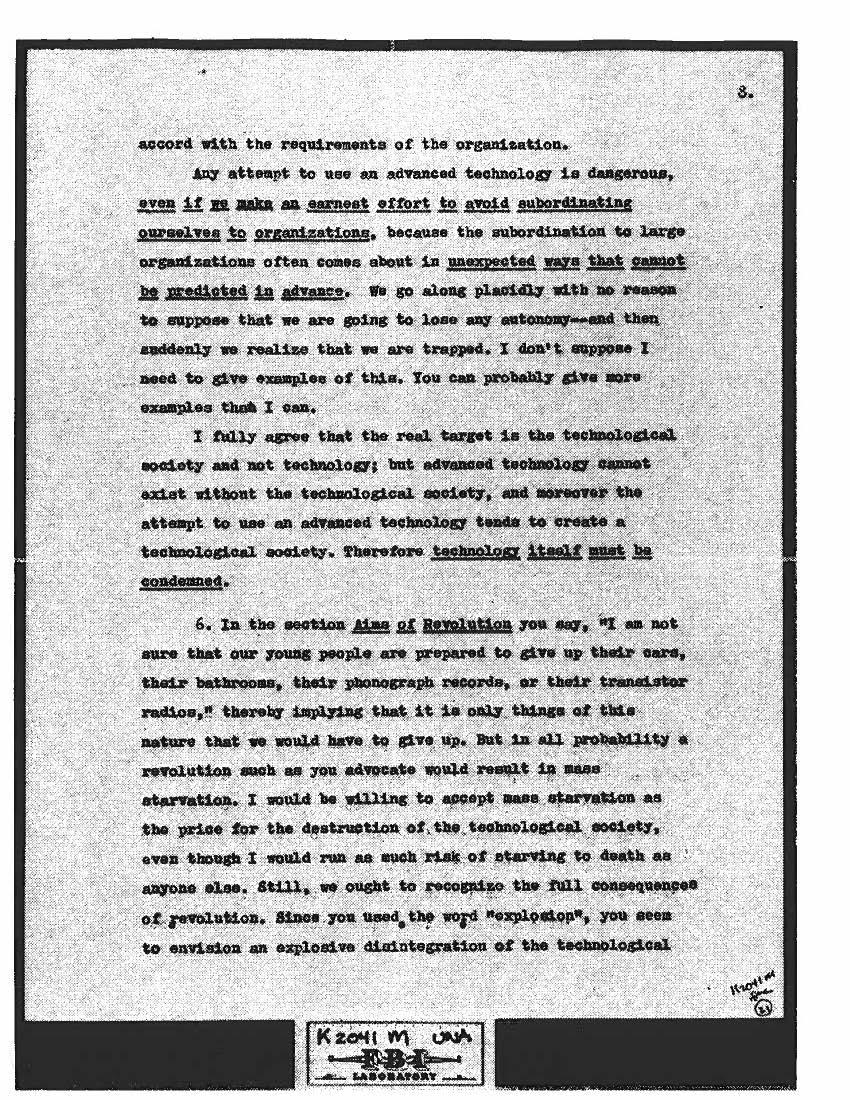

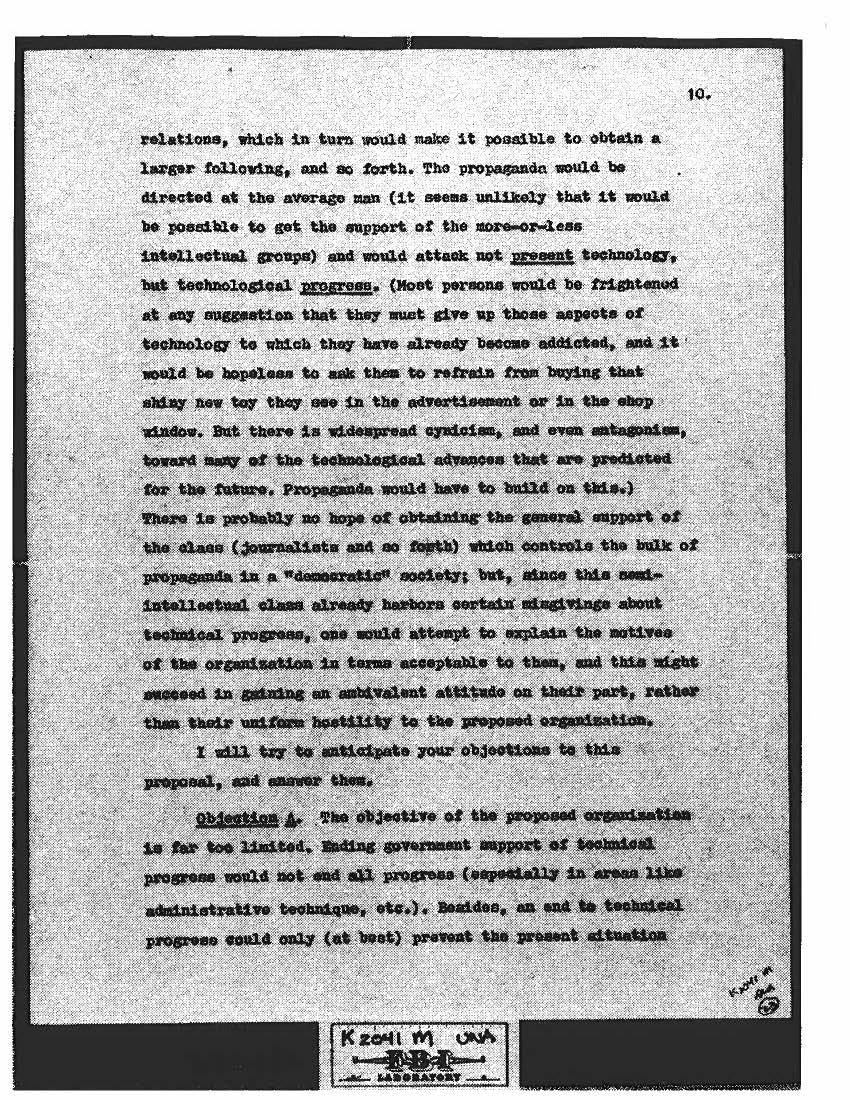
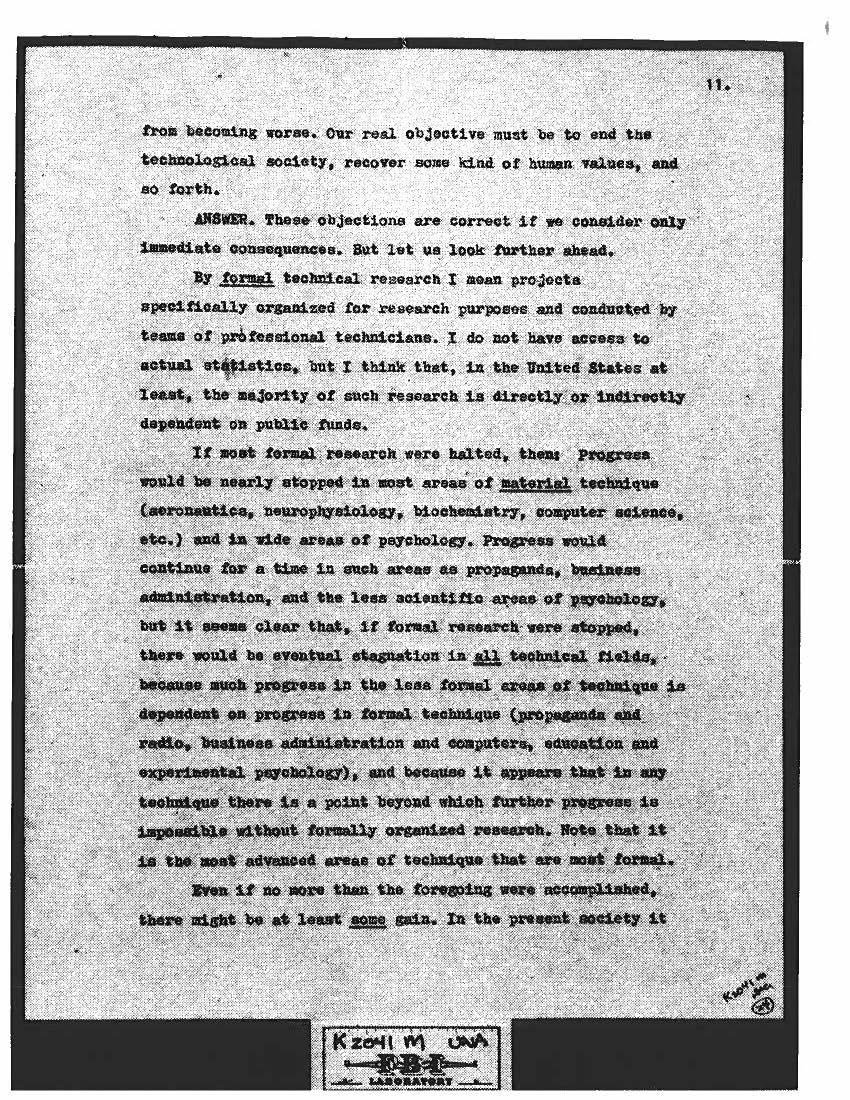
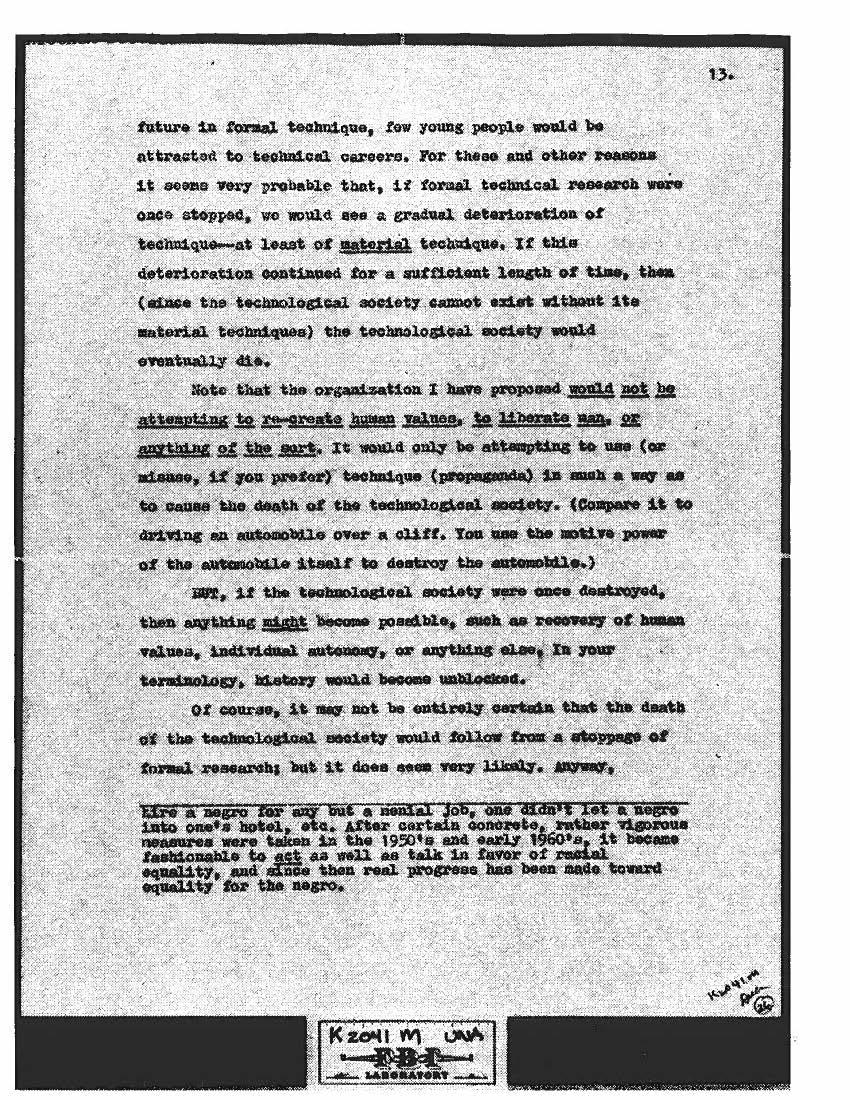
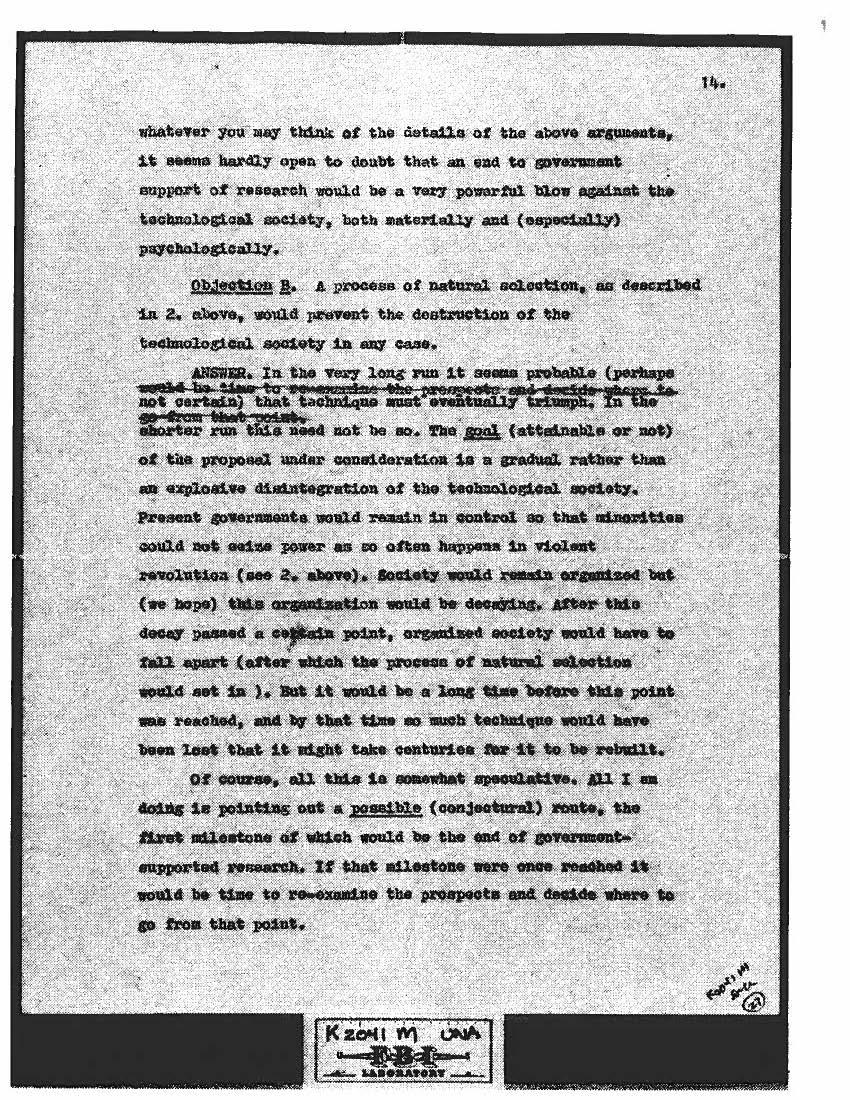
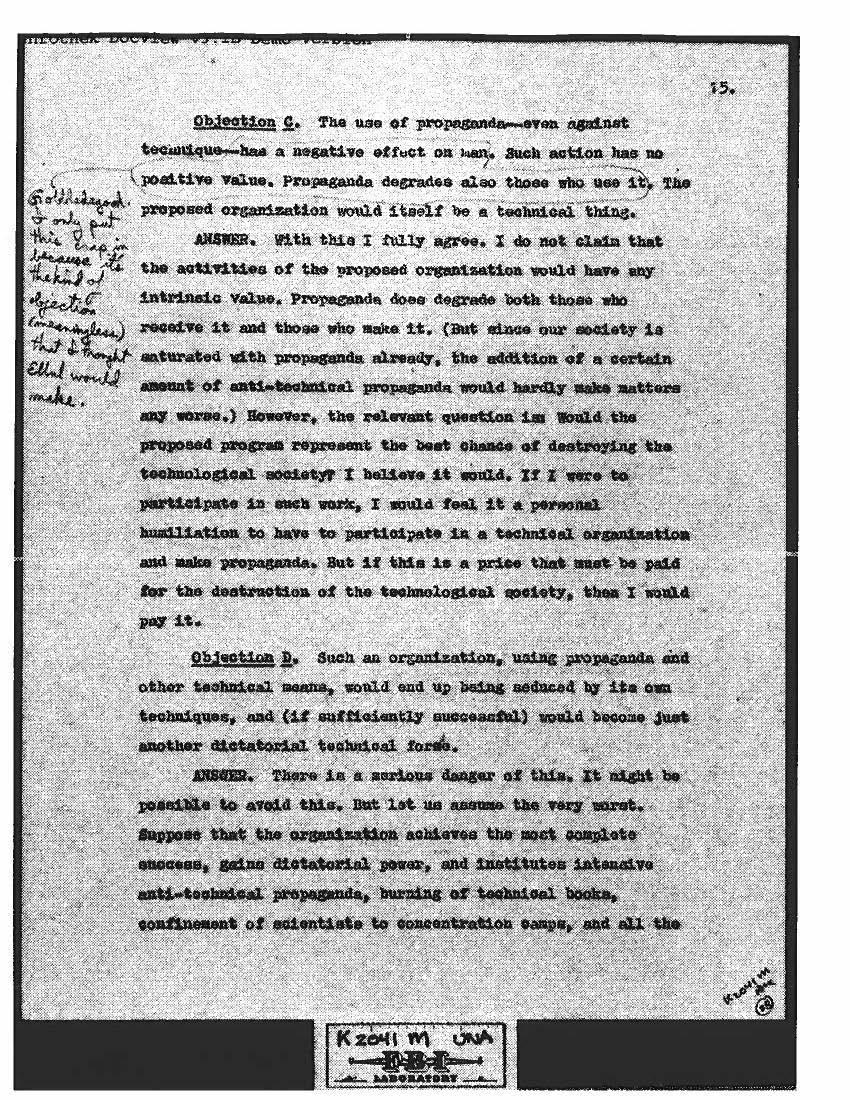
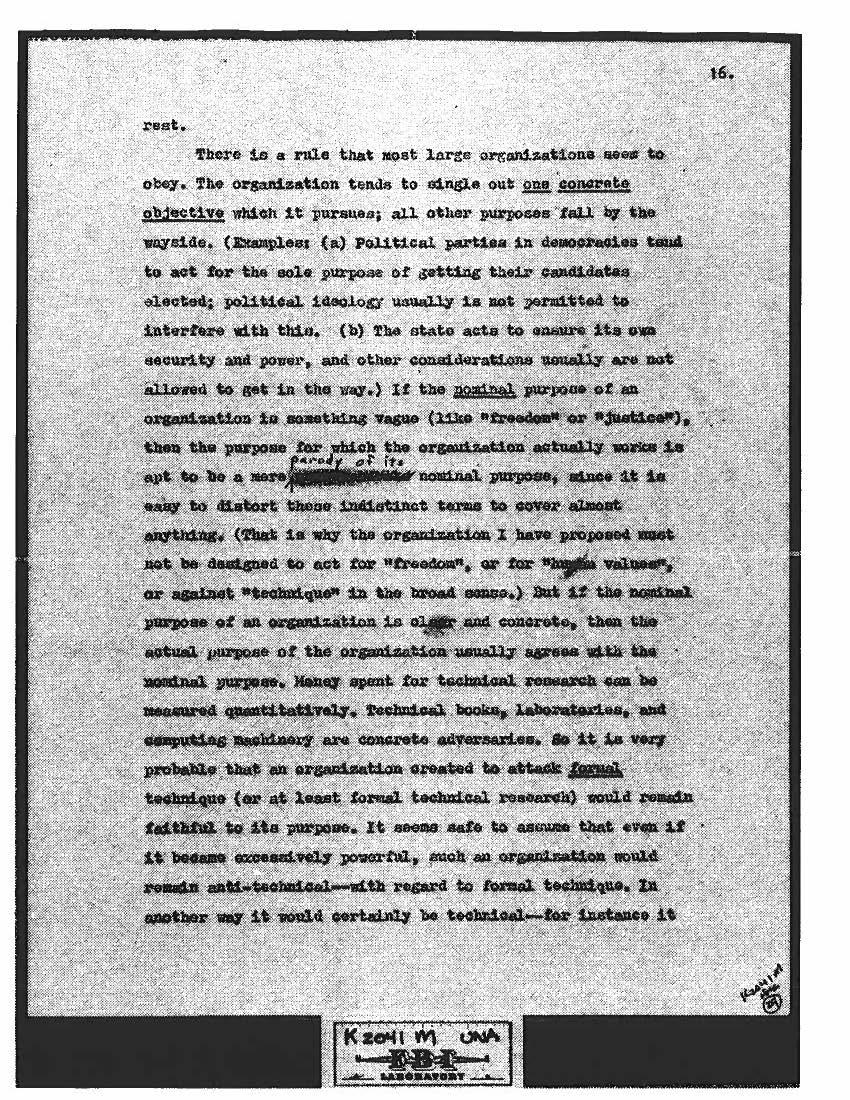
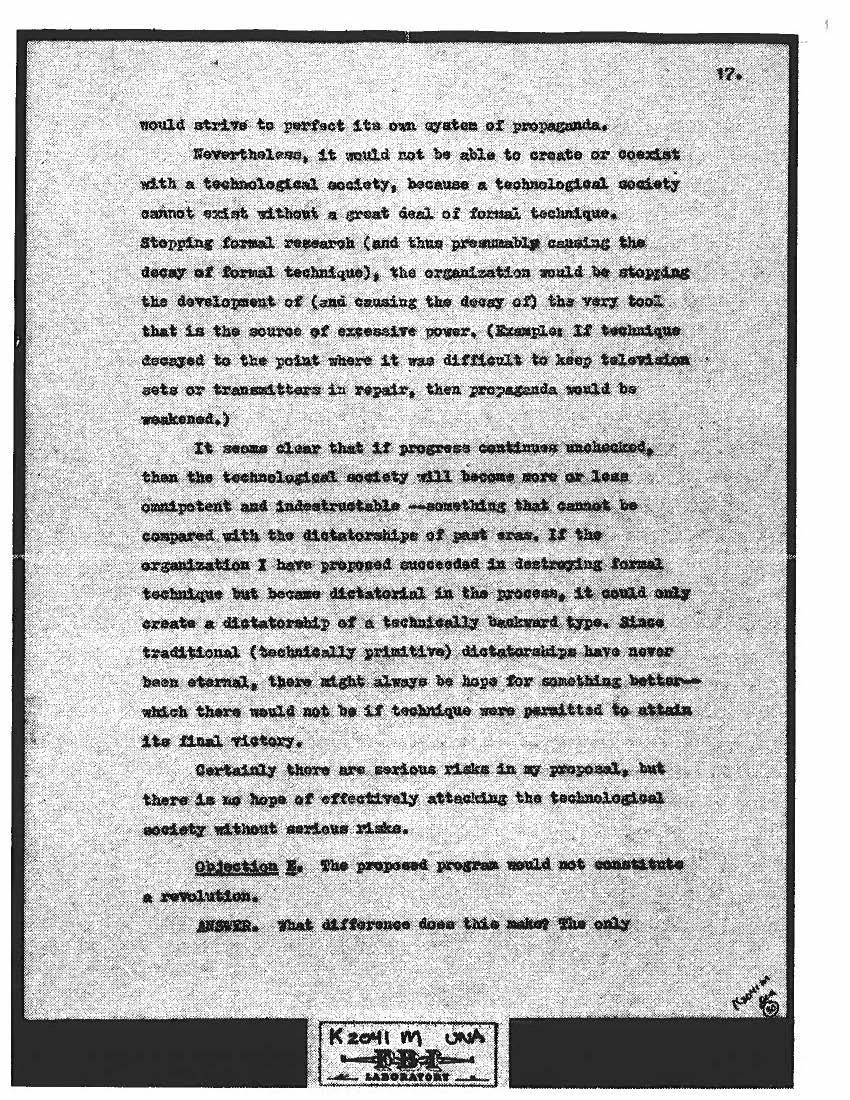
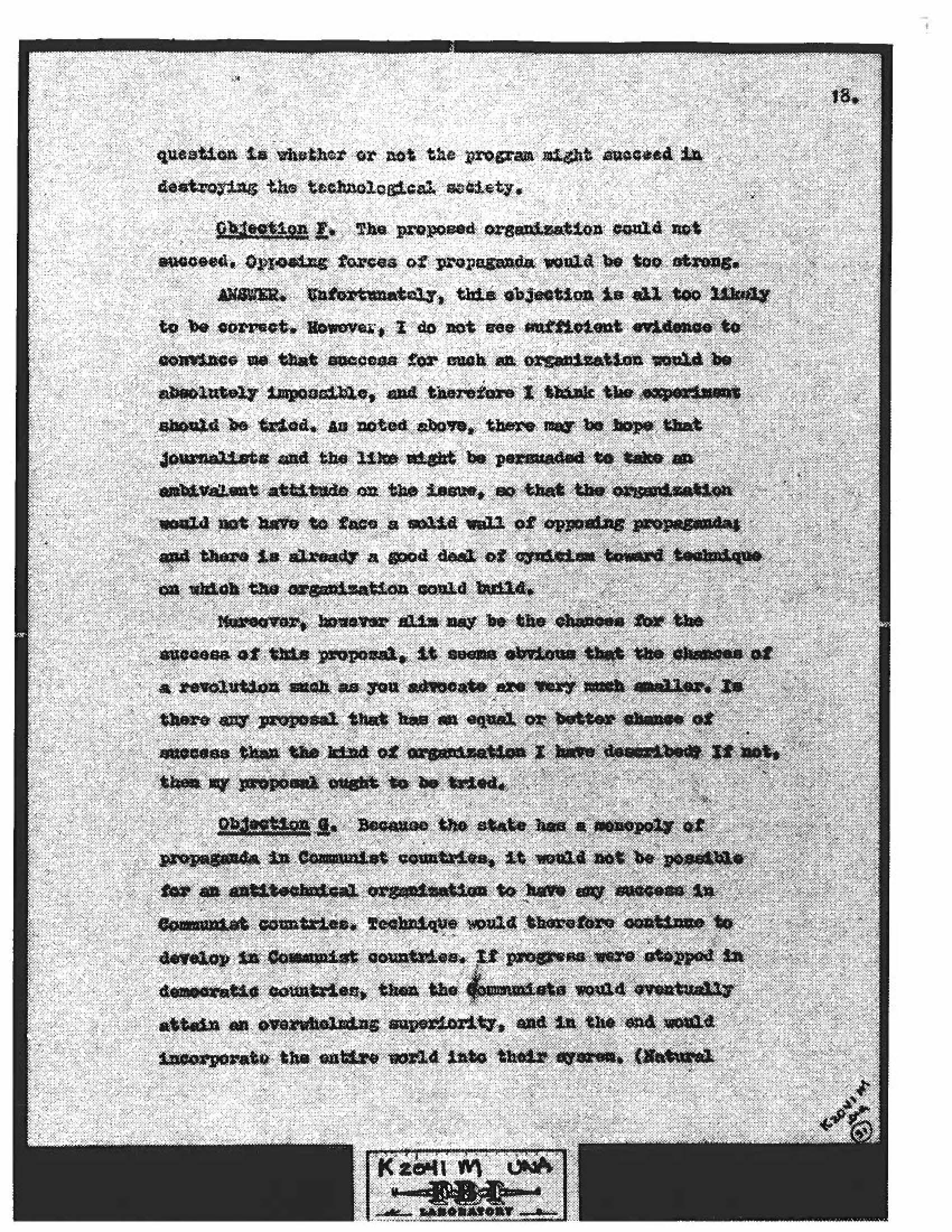

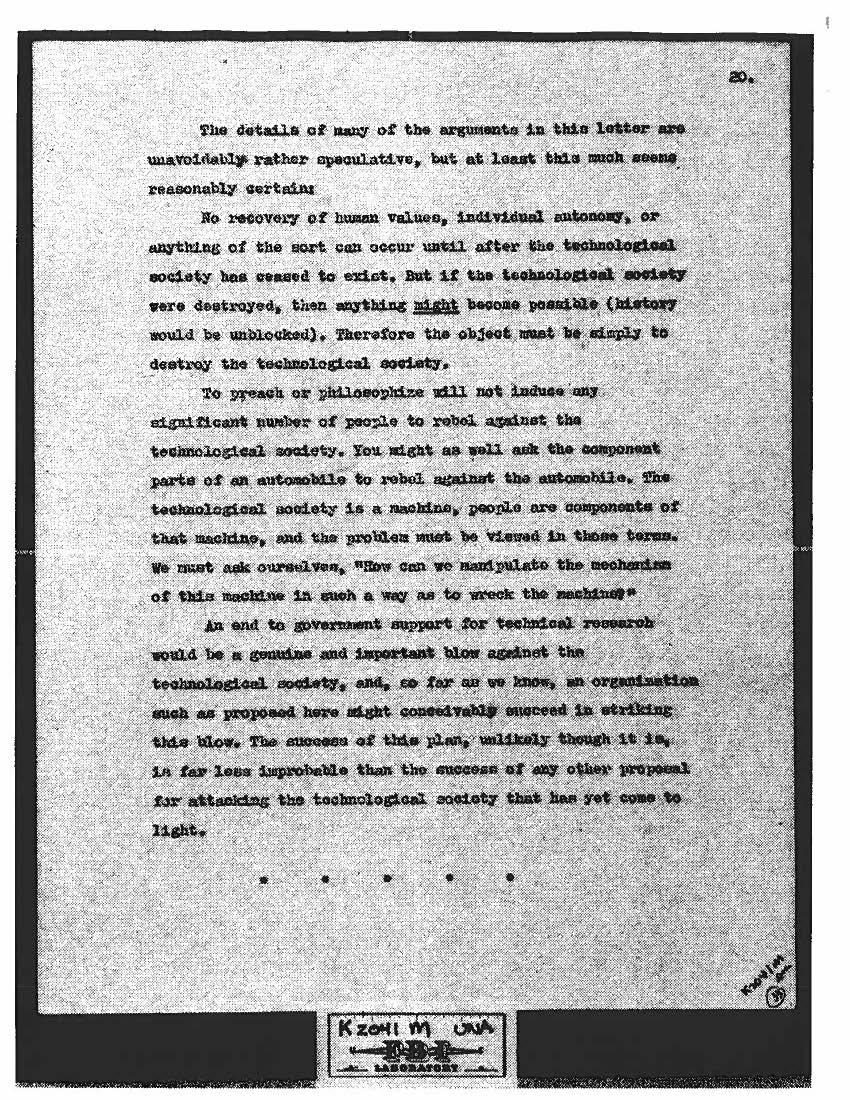

{1} [footnote continued from missing page] hire a negro for any but a menial job, one didn't let a negro into one's hotel, etc. After certain concrete, rather vigorous measures were takin in the 1950's and early 1960's, it became fashionable to act as well as talk in favor of racial equality, and since then real progress has been made toward equality for the negro.